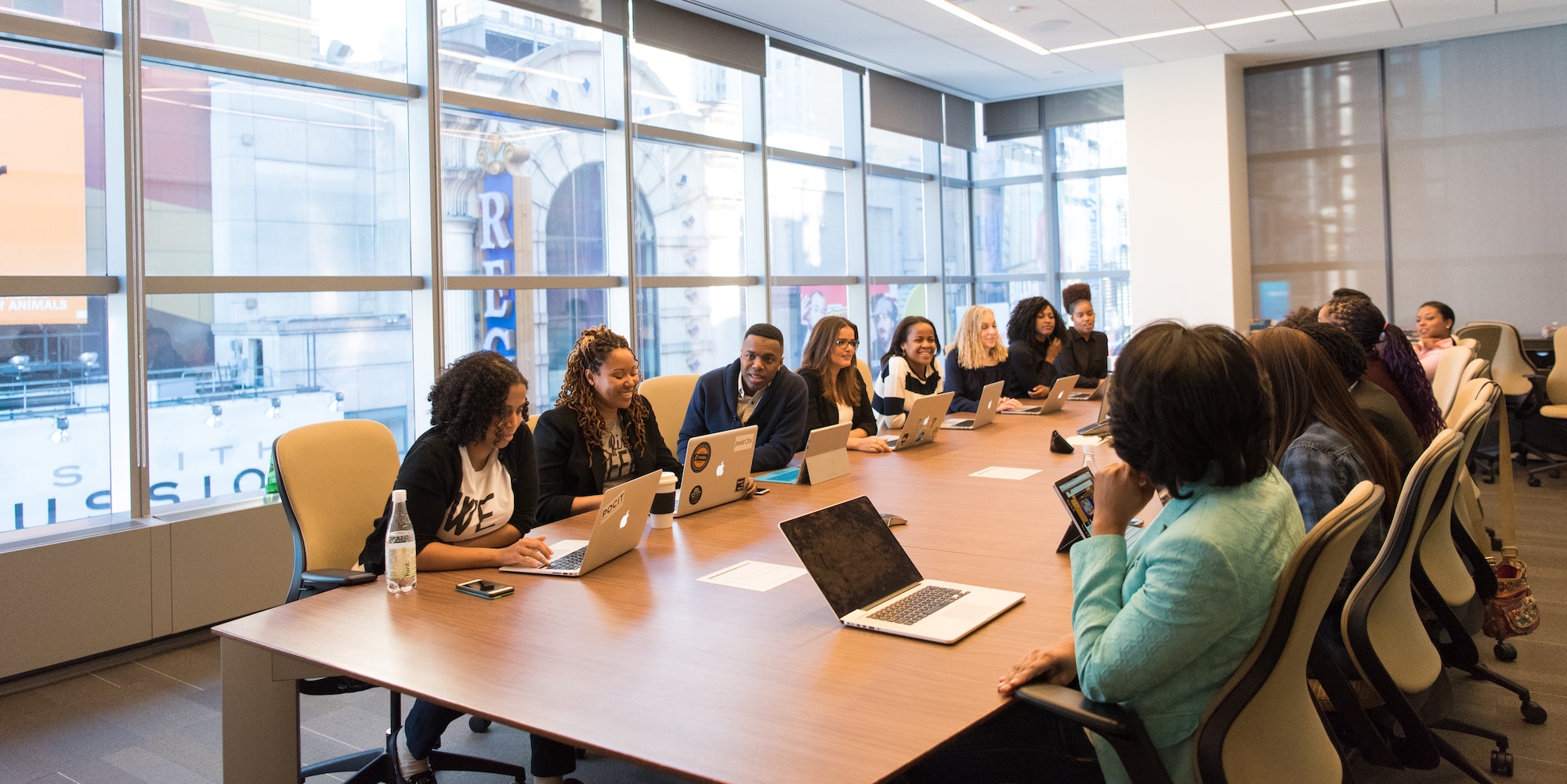Clarity through Hindsight - Time to Plan for 2022
Time is finite. You need to know exactly where to invest your hours and energy to get the results you actually want - Your Oxygen Mask First
 I spotted this sign on the wall of a café in Westbank, BC (West Kelowna) while chatting with someone about how business was notably down during COVID-19.
I spotted this sign on the wall of a café in Westbank, BC (West Kelowna) while chatting with someone about how business was notably down during COVID-19.
Since we know things don't always work out as we want them to, there’s an opportunity to harness the power of reflection - to look back, learn and be more prepared and more successful in the future.
Hindsight always brings clarity.
In October, I did a simple exercise with a YPO forum in the US. After giving them perspective on stress and mental health for CEOs and executives, we took the tools from Chapter 17 Plan, Plan & Plan Again of Your Oxygen Mask First to reflect on the past year - what worked, what didn't work as well, and how they would do it better next time - to think about what they wanted in the short, medium and long term.
Finally, they set their #1 priorities for Work, Self and Life.
Talking about mental health and doing a reflection, within a structure that provided more clarity, helped them to figure out what was most important to them – and helped them to set better goals not just for Work but for Self and Life.
So, as you plan for 2022, here are two things to think about:
- Focus only on what you can control now.
- Reflect to get clear on what you would like to happen over the next year, in your Work, Self and Life.
2022 Plan Template
Our Master Plan template is the ideal tool to clarify long-, medium- and short-term goals, and to start 2022 in the direction that matters most to you. It includes:
- Annual and quarterly reflections to look back and evaluate how you did versus what you intended, and to gather perspectives on what you've learned to create more of what you want in the future
- After-action reviews (postmortems) at the end of every business quarter, and after every major project, for what worked well and what didn’t. We can never predict all that's going to happen, but we can increase our ability to be more capable by learning from these experiences.
- What you can do to be more effective next time.
The Challenge
- Whether it's with your forum, advisors, executive team, coach or spouse, how can you carve out three to four hours to reflect on 2021?
- Use the Master Plan as a tool, then reset what's most important in your world for the rest of your life, the next few years, and then the first 90 days of next year.
- Set your #1 priorities for Work, Self and Life.
If you would like one of our skilled coaches to work with you to draft your Master Plan, please get in touch – and ask about bulk order purchases of Your Oxygen Mask First.
Lawrence & Co’s work focuses on sustainable and enhanced growth for you and your business. Our diverse and experienced group of advisors can help your leaders and executive teams stay competitive through the use of various learning tools including workshops, webinars, executive retreats, or one-to-one coaching.
We help high-achieving leaders to have it all – a great business and a rewarding life. Contact us for simple and impactful advice. No BS. No fluff.
4 Questions to Ask Your Customers
“If you’re not asking the right questions, you could be missing out on 70% to 80% of the most valuable information you could have.” - The Growth Whisperers Podcast
How often have you sought feedback and market intel from a customer in the last month?
Once?
Twice?
10 times?
If you've done that even three, four or five times, hats off to you: you're doing a great job!
I know it’s really hard for most of us - sometimes all of us - to make the time to get out of our offices and meetings with our teams to stay connected to the market and the customers we serve.
Do you have enough first-hand intel to:
- Make the best decisions?
- Know what your customers are thinking – and how their minds or their needs are changing?
- Understand how your competitors are changing in the marketplace, from the eyes of your customers?
- Know how your business is doing from the eyes and mouths of your customers?
Key Questions to Ask Your Customers
From the book Scaling Up 2.0, for which I was a key driver, here are four critical questions to ask your customers:
- How are you doing?
- What’s going on in your industry or your neighbourhood?
- What are you hearing about our competitors?
- How are we doing?
Your key role is to get out there and get this qualitative data to validate your strategy, understand what’s important to customers, learn about the industry and your competitors and your team’s performance.
The Challenge
- In the next month, get out and ask three or four customers the 4Qs - maybe one each week.
- Even better, get your whole team to do the same thing.
For more about gathering key intel from your customers, listen to episode 78 of The Growth Whisperers.
Lawrence & Co’s work focuses on sustainable and enhanced growth for you and your business. Our diverse and experienced group of advisors can help your leaders and executive teams stay competitive through the use of various learning tools including workshops, webinars, executive retreats, or one-to-one coaching.
We help high-achieving leaders to have it all – a great business and a rewarding life. Contact us for simple and impactful advice. No BS. No fluff.
How to Build a Great Team
If you’ve ever been on a great team, and then left your role or joined a new company, but found yourself instead on a mediocre team, you know it can feel like a curse.
It takes time, many small things, and focus and momentum to build a great team. It begins with basic rules of engagement. This mirrors how we start off with new clients - when we talk about how we as a team agree to work together.
This includes:
- Crystal clear goals and clear measures of success in order to see performance markers clearly.
- Clarity on where we align and where we don’t – and how we’ll come back together to sort things out.
- Giving feedback about what is being done well, and how to improve. Such as giving 360-degree feedback with succinct, direct, mostly qualitative questions that provide actionable information. (See Chapter 9 in Your Oxygen Mask First)
Most importantly, we recognize the value of debate - a full day a month works well - to talk about the most important issues, to get to know each other, to align and move ahead. It’s also a great way to sort out issues quickly, instead of allowing them to linger over the team.
The Challenge
- What one or two things can you do tune-up the team you are now, in order to make it notably more effective, healthier and higher performing?
To learn more, listen to Episode 77 of The Growth Whisperers Leadership Podcast.
Lawrence & Co’s work focuses on sustainable and enhanced growth for you and your business. Our diverse and experienced group of advisors can help your leaders and executive teams stay competitive through the use of various learning tools including workshops, webinars, executive retreats, or one-to-one coaching.
We help high-achieving leaders to have it all – a great business and a rewarding life. Contact us for simple and impactful advice. No BS. No fluff.
The Great Resignation: What is it Going to Take to Retain Your Top Talent?
“Put as much energy into retaining your people as you do for your top clients.”
Kevin Lawrence
How many hours do you dedicate to not just the productivity of your best people but to their retention?
Do you know how they're getting along with their team?
Are they on track for the most important priorities?
How likely are they to stay?
What is it going to take to make sure they stay for a long time?
After putting an incredible amount of energy into hiring, training or grooming top people, we get so busy that we don't do the work we need to in order to protect our biggest asset.
Right now, there’s a lot of hype about The Great Resignation, the international, widespread concern of significant numbers of workers leaving their jobs. While I don't think everyone's going to sign out, I do know that we're currently in a very tight job market. We’re having to work doubly hard to recruit people with companies we work with around the world.
From April to July, nearly 16 million Americans quit their jobs and another 4 million+ people (the latter is roughly 2.9% of the US population) quit their jobs in August. (US Labour)
Mitigate the Great Resignation by Doubling your efforts
Our advice? Put double the energy into retaining the awesome people you have and make sure that they are engaged and productive.
That only works if you spend some significant time on it. I don't know whether you should spend one, two or four hours a week, but make sure you're doing the right retention activities for your company. This includes stay interviews, knowing your people well, investigating their frustrations and making sure you continue to have a fun place where people want to work.
The Challenge
- How many hours a week over the next four weeks should you be spending on retention?
- Whatever you think – double it.
For more about what can you do to retain your people, listen to Episode 80 of The Growth Whisperers podcast.
Lawrence & Co’s work focuses on sustainable and enhanced growth for you and your business. Our diverse and experienced group of advisors can help your leaders and executive teams stay competitive through the use of various learning tools including workshops, webinars, executive retreats, or one-to-one coaching.
We help high-achieving leaders to have it all – a great business and a rewarding life. Contact us for simple and impactful advice. No BS. No fluff.
The Importance of Reflection
We recently lost a good friend – a young guy who was a member at our racetrack. I just loved the guy - one of the happiest people you’d ever meet.
These big events - the birth of a new child in the family, a marriage, a loss or tragedy - cause us to stop and reflect and, perhaps, reset and make changes that better serve our Work, Self and Life.
Sometimes we reflect by talking to family during dinner, when catching up with friends, meeting with our financial planner, or the doctor for a checkup.
I reflect almost daily when I write.
I don't think you can underestimate the importance of reflection. So, maybe we need to reflect and reset on a regular basis as a discipline - such as on a quarterly basis, when we review how we're doing in our world.
The Challenge
- What are your mechanisms to reflect and reset your plans?
- If you haven't done a quarterly reset for your goals, here’s a tool to help you through the process.
- How can you make the next week, month, quarter year better, more fulfilling and more rewarding?
Hear more about the importance of regular reflection and reset in this episode of The Growth Whisperers podcast.
Lawrence & Co’s work focuses on sustainable and enhanced growth for you and your business. Our diverse and experienced group of advisors can help your leaders and executive teams stay competitive through the use of various learning tools including workshops, webinars, executive retreats, or one-to-one coaching.
We help high-achieving leaders to have it all – a great business and a rewarding life. Contact us for simple and impactful advice. No BS. No fluff.
[Video] 5 Common Mistakes to Avoid When Creating a COVID-19 Employee Vaccination Policy
I recently had a conversation with Laurie Ballantyne, one of our awesome new advisors (with a deep HR background), about the most common mistakes people make when creating COVID-19 company policies.
It can be hard to know what to do with such a challenging and polarizing issue. There’s a lot to consider - and it’s critical to get the right policy that takes care of people, from a business and personal perspective.
Approaches vary. Some have pushed ahead with 100% vaccination requirements, others want to give people complete choice, and still others are playing the wait-and-see game hoping government agencies will decide for them.
While we don’t know what’s right for you, we wanted to share Laurie’s insights about the mistakes she sees well-intentioned people making that end up leading to ineffective policies.
[1] Not enough thought about the consequences
In the rush to create a policy, it’s important to think about the potential impact and consequences of your decisions – and if and how you will deal with them.
Example: Your employee vaccination policy makes proof of COVID-19 vaccination mandatory as a condition of employment. But then you find out your top performer is not vaccinated, for whatever reason. With an “all or nothing” policy choice, you may lose an A-Player in a situation that could have been avoided with a little more due diligence before wrapping up the policy.
People choose not to be vaccinated – or cannot be vaccinated – for a variety of reasons. A leadership team’s role is not to debate sides or to change anyone’s mind. Their responsibility is to provide the proper protections for both vaccinated and unvaccinated employees to do their best to provide a safe work environment, psychologically and physically.
[2] Hope public health will make employee vaccination policy decisions for you
You are overwhelmed and uncomfortable deciding what is right for your people and your organization, so you do nothing.
Example: You have an outbreak when someone tests positive. With no plans in place about how to handle the situation, an employee files a complaint with the occupational health and safety governing body that you have not fulfilled your obligation as an employer to provide a safe work environment for employees. Not taking that obligation seriously can land you in hot water.
An employer is required to protect employees and to provide a safe work environment – to do whatever is reasonable. And “reasonable” is hard to define. We all know the minimum mandated public guidelines about social distancing and mask-wearing, but many companies are not good at reinforcing those habits in the work environment.
We all get loose when following guidelines when we think we have some armour of vaccination protection - and, sometimes, senior leaders can set the worst example by, say, not wearing masks in meetings. People need to remember that vaccinated people can still carry the virus. We are protecting not just the unvaccinated but the vaccinated, as well. There’s risk both ways.
With more due diligence, outbreaks that send people home sick can be avoided.
[3] No clarity on cost and execution
When you're in the boardroom, be aware of all the repercussions of your decisions. Ask:
- What are all the financial costs and logistics of implementing an employee vaccination policy?
- Who is responsible – and who wants that job?
- Is it reasonable ask that person?
- Are you putting them at risk by having them continually engage and interact with others?
Implementing and monitoring a policy takes time, energy and effort - and cannot just be given it to a random administrative person.
- If you accept regular testing of unvaccinated employees:
- What kind of tests? (PCR rapid antigen test, self-administered rapid…)
- Who pays for testing?
- Who administers and monitors it?
- Who hands out the tests and ensures they are administered properly?
- Do you provide appropriate space in your workplace?
- Who collects and reports the data?
Example: In Manitoba, when you get a pack of rapid tests from the government or a pharmacy, you have to record the serial number of the test, the person who took it, the date it was taken and the results. When the box of tests is empty, you take it and all the data back to pharmacy and trade it in for a new box. If someone tests positive, the result must be reported right away.
[4] Underestimating employee responses and the impact on their mental health
Your employee vaccination policy decisions can be far more upsetting than you anticipate.
Some people may not be sympathetic to the reasons others are - or are not - vaccinated.
Some people may experience a lot of anxiety about safety in the work environment, whether there will be accommodations to enable them to work remotely if they are unvaccinated, or if they may lose their job.
Here are two examples:
- A company communicated to their employees that they were working on a policy. They asked employees to self-declare whether they are vaccinated and said they were rolling out the policy on a certain date. When rollout day came and the policy still wasn’t ready, one employee admitted she had been so anxious about the anticipated policy, she’d lost sleep and was struggling to focus on work. The uncertainty affected the mental health of others, as well.
- A company indicated a condition of employment was proof of vaccination. While that worked for new hires, candidates who were existing employees are trickier. One candidate, who knew a policy was pending, asked to be put on hold and withdraw from the interview process until she knew what the policy was. She couldn't handle the pressure and anxiety of worrying about whether she would potentially miss or be denied an opportunity based on vaccine status.
Yet another company doesn’t allow discussions about COVID-19 and vaccinations, as part of their policy, because they can be deep and polarizing issues.
Don’t underestimate how different, difficult and significant people’s responses can be.
[5] No communications plan
A thoughtful strategy is required to introduce, execute and sustain the policy – and to go way above and beyond what you think is going to be necessary.
- Who is the dedicated team on your leadership group to answer questions, provide support and deal with a variety of responses?
- How will you handle resistance?
People are so busy doing what they're doing. They spent lots of time thinking about a policy and then roll it out without a plan and wonder why there's a wall of resistance.
summary:
Before you create your policy:
- Think about all the consequences before rollout
- Remember that your job is to protect and take care of all your employees
- Be clear the logistics and financial costs, including any accommodations you offer
- Understand the impacts on people’s well-being and stress levels
- Ensure you have a strong communications plan.
If you need additional assistance, or need help with ideas or troubleshooting, please reach out.
Lawrence & Co’s work focuses on sustainable and enhanced growth for you and your business. Our diverse and experienced group of advisors can help your leaders and executive teams stay competitive through the use of various learning tools including workshops, webinars, executive retreats, or one-to-one coaching.
We help high-achieving leaders to have it all – a great business and a rewarding life. Contact us for simple and impactful advice. No BS. No fluff.





